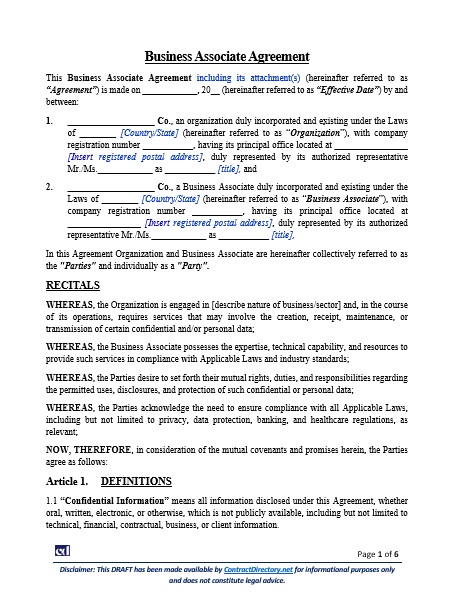Estimated reading time: 2 minutes
Defining the Business Associate Agreement
A Business Associate Agreement (BAA) is a contract between an organization and a third-party service provider. It sets out terms for handling confidential information, personal data, and compliance requirements. A BAA protects both parties and ensures that sensitive data is processed legally and securely.

Main Clauses in a Business Associate Agreement
A professional BAA includes several critical clauses. These cover definitions, scope of services, confidentiality, data protection, and intellectual property. Indemnification, limitation of liability, dispute resolution, and governing law also form essential parts. Furthermore, the agreement outlines fees, payment terms, and termination rights. Each clause defines responsibilities and sets clear boundaries.
Binding Duties and Compliance Standards
The BAA imposes binding duties on the Business Associate. They must comply with data protection laws, notify breaches promptly, and maintain secure systems. Organizations must provide accurate instructions and pay fees in accordance with the contract. Compliance with HIPAA, GDPR, or similar laws ensures both parties avoid regulatory penalties. The agreement also clarifies which provisions remain binding after termination.
Importance of Business Associate Agreements
Business Associate Agreements build trust and minimize risk. They align service delivery with legal standards and industry practices. They also prevent misuse of personal data and protect intellectual property. By defining rights and responsibilities, a BAA supports long-term cooperation and reduces disputes. Organizations and associates benefit from certainty, security, and professional accountability.
Check out more pages of our website for related content:
References
- Information Commissioner’s Office (ICO – UK) – “Contracts and Liabilities Between Controllers and Processors” – Provides guidance on required clauses, data protection duties, and compliance under UK GDPR that apply to BAAs.
- European Data Protection Board (EDPB) – “Guidelines 07/2020 on the Concepts of Controller and Processor” – Clarifies compliance duties, contractual obligations, and post-termination responsibilities relevant to BAAs under EU GDPR.
has been added to your cart!
have been added to your cart!



